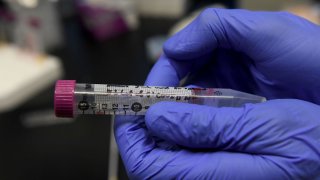
World Health Organization officials said Monday that patients who recover from COVID-19 may be able to get the coronavirus again, adding that studies suggest their immunity may wane after a few months.
Emphasizing that scientists don’t yet have a complete answer, Dr. Maria Van Kerkhove, head of the WHO’s emerging diseases and zoonosis unit, said patients “do mount some level of an immune response.”
“What we don’t know is how strong that protection is and for how long that protection will last,” she said at a news conference at the organization’s Geneva headquarters. “So there are a number of studies under way that are trying to answer these questions.”
Antibodies are generally produced in response to foreign particles or antigens that invade the body and help the body’s immune system fight off infections. When a person gets sick with a virus, they produce antibodies to that particular virus in the recovery process, which generally protects them from getting reinfected.
In the case of the COVID-19 virus, health officials have said there is insufficient data to indicate that antibodies ensure immunity against the virus.
“We don’t know yet whether it’s possible with this particular virus ... We do know with other coronaviruses that is the case, and there is some data out there that may suggest that immunity will wane over time, but that is not fully known at this point,” said Dr. Mike Ryan, executive director of the WHO’s health emergencies program.
A study published in Nature Medicine last month showed that coronavirus antibodies could last only two to three months after a person becomes infected with the virus.
Researchers in the Wanzhou District of China compared the antibody response of 37 asymptomatic people with that of 37 symptomatic people. They found that people without symptoms had a weaker antibody response than those with symptoms.
Although the study is small, its findings may have large implications for vaccine development as scientists continue to learn more about how immune systems respond to the virus in a sick patient.
Dr. Anthony Fauci, director of the National Institute of Allergy and Infectious Diseases, said in early June that a vaccine may not provide long-term immunity if COVID-19 behaves like other coronaviruses.
“When you look at the history of coronaviruses, the common coronaviruses that cause the common cold, the reports in the literature are that the durability of immunity that’s protective ranges from three to six months to almost always less than a year,” he said during an interview on June 2 with JAMA Editor Howard Bauchner.
As several drug companies move closer to coming up with a potential vaccine for the virus, the role of antibodies could become even more important in determining how well the vaccine works and how often one would need to receive it, or a booster, to prolong protection.
Fauci said July 6 during a Q&A discussion with Dr. Francis Collins, director of the National Institutes of Health, that he does not know how long antibodies might offer immunity against infection.
“With this spike protein that’s being presented in the way that we do it with primes and in some cases boosts, we’re going to assume that there’s a degree of protection, but we have to assume that it’s going to be finite,” he said.
“It’s not going to be like a measles vaccine.”
This story first appeared on CNBC.com. More from CNBC:

